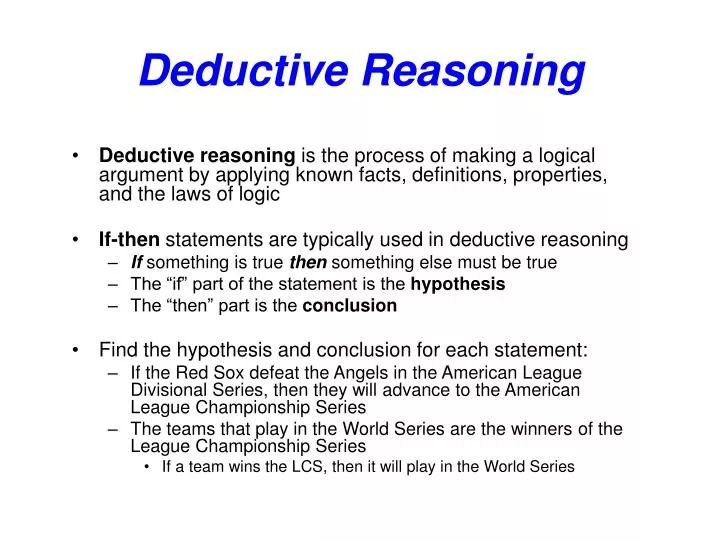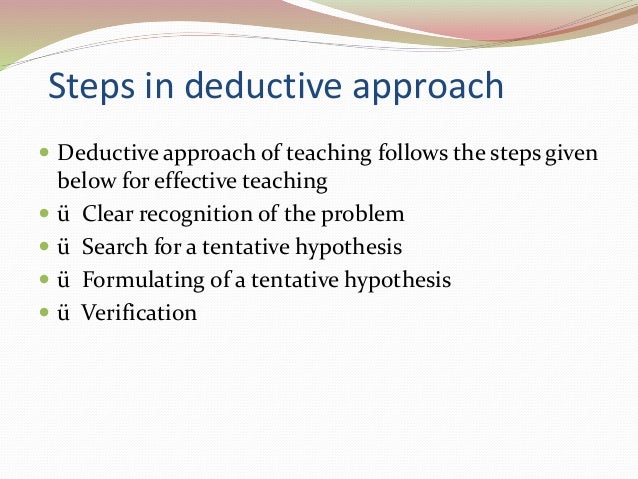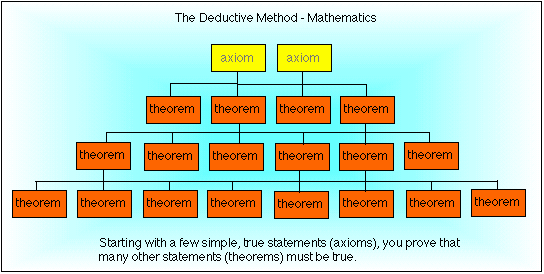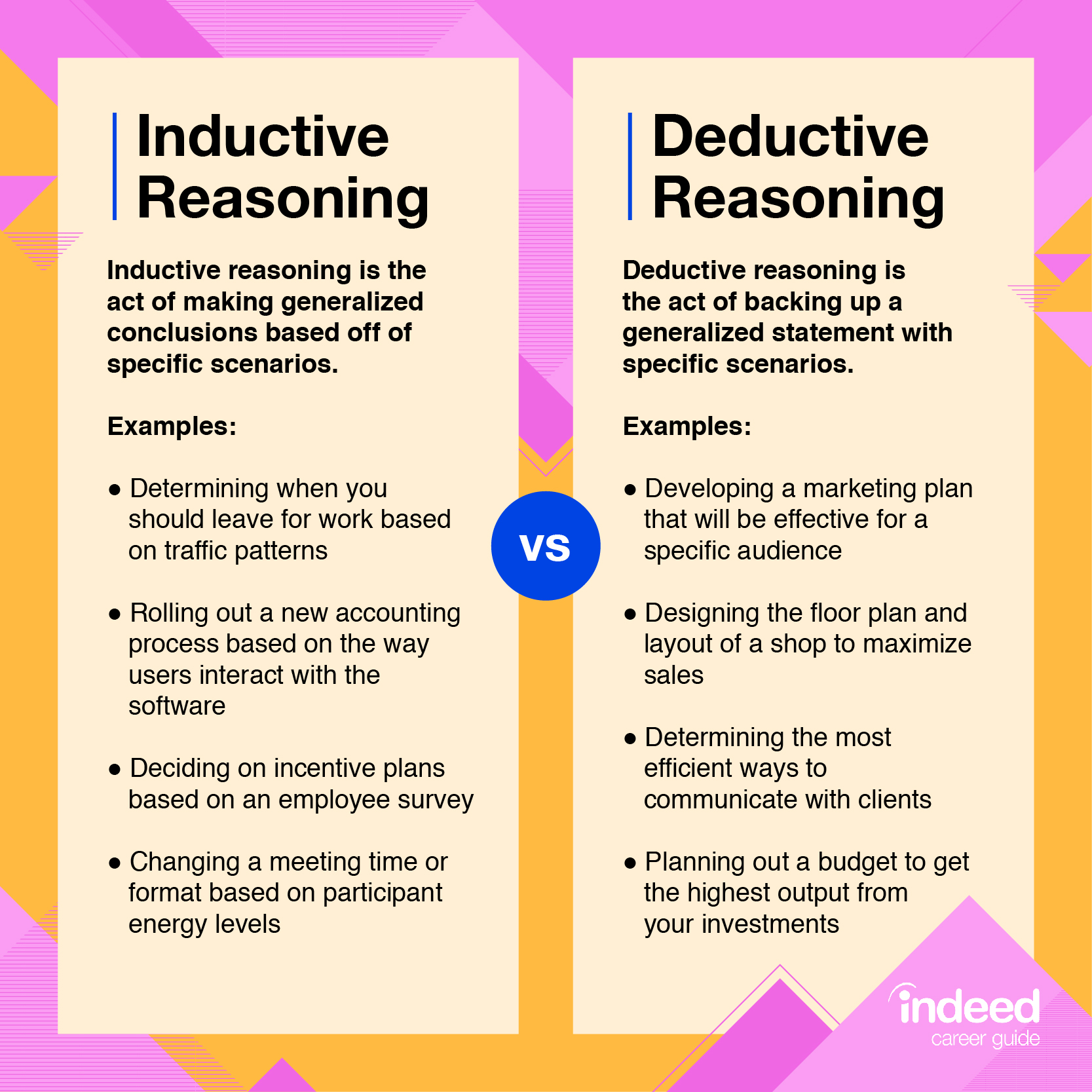Deductive methods

Deductive reasoning examples
Deductive Reasoning: Definition and Examples February 8, There are many mental tools we can use and improve upon to make important decisions at work. Reasoning is one that often occurs naturally and includes inductive, deductive and abductive methods. In this article, we deductive methods what deductive reasoning is and how you can use it in professional settings. Related: Inductive vs. Deductive Reasoning What is deductive reasoning?

Deductive reasoning is the process of drawing a conclusion based on premises that are generally assumed to be true. Also called "deductive logic," this act uses a logical premise to reach a logical conclusion. Deductive reasoning is often referred to as "top-down reasoning. We know this because we were already provided with the deductive methods we assume to be true—the trunk is large.

Based on our deductive reasoning skills, we know deductive methods a bike does not fit in an already large trunk, then it must also be large. So long as the two premises are based on accurate information, the outcome of this type of conclusion is often true.

Syllogism refers to two statements—a major and a minor statement—join to form a logical conclusion. The two accurate statements mean that the statement will likely be true for all additional premises of that category.

This generally occurs when one of the first assumptive statements is false. It is also possible to come to an accurate conclusion even if one or both of the generalized premises are false.]
Deductive methods - me
Inductive and deductive methods of research - rectoria. Each method has its advantages and its use will depend on the situation to be investigated, the field you want to study or the approach you want to have. Deductive reasoning works by working from the most general to the most specific. You can begin by thinking of a theory on some topic of interest. It then boils down to some specific hypothesis that you want to test. On the other hand, the inductive method works in the opposite way: it starts from the most specific to the generalizations and broader theories. In inductive reasoning, we begin with specific observations and measures to arrive at some general conclusions. These two methods are very different and offer different elements when carrying out an investigation. Skip to search form Skip to main content You are currently offline.Deductive methods - recommend look
Page I. Deductive logics In this chapter and the next we will study two deductive logics—two approaches to evaluating deductive arguments. Again, these are two different approaches to the same problem: evaluating deductive arguments, determining whether they are valid or invalid. Recall, deductive arguments are valid just in case their premises guarantee their conclusions; and validity is determined entirely by the form of the argument. The two logics we study will have different ways of identifying the logical form of arguments, and different methods of testing those forms for validity. These are two of the things a deductive logic must do: specify precise criteria for determining logical form and develop a way of testing it for validity. But before a logic can do those two things, there is a preliminary job: it must tame natural language. Real arguments that we care about evaluating are expressed in natural languages like English, Greek, etc. As we saw in our discussion of the logical fallacies in the last chapter, natural languages are unruly: they are filled with ambiguity and vagueness, and exhibit an overall lack of precision that makes it very difficult to conduct the kind of rigorous analysis necessary to determine whether or not an argument is valid. So before making that determination, a logic must do some tidying up; it must remove the imprecision inherent in natural language expressions of arguments and make them suitable for rigorous analysis.Think: Deductive methods
| DISSERTATION HELP SERVICE | Advantages And Disadvantages Of Storage Systems For |
| STRATEGIC TRAINING AND DEVELOPMENT A GATEWAY 2 | Compare and Contrast the Pre and Post |
| FRIENDLY CARDS CASE ANALYSIS | 361 |
Deductive methods Video
Deductive and inductive method in economics - economics basics deductive methods.![[BKEYWORD-0-3] Deductive methods](https://dpuk71x9wlmkf.cloudfront.net/assets/2020/02/10170113/10_V4-01.jpg)

the advantages of a codified constitution now outweigh the disadvantages
2021-10-20
Digor
I apologise, but, in my opinion, you are not right. Let's discuss. Write to me in PM.
Descriptive essay
2021-10-27
Yorisar
It agree, this rather good idea is necessary just by the way

Category
Best Posts
- jahangir
- editing thesis
- The Engineer Extraordinaire
- piaget vs vygotsky similarities
- Causes Of Tsunami Essay
- nazism and stalinism
- behaviorism constructivism and icts for education
- Economies Of Scale Essays
- kindred healthcare employee paperless
- academic editing services
- The Importance Of Gender In Nursing
- harvard referencing






 412
412